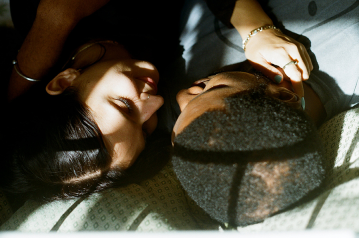Top tips when you're recovering from an egg retrieval

Between appointments, giving yourself injections, and managing all of the administrative back-and-forth, the weeks leading up to your egg retrieval are busy. After your retrieval, though, your schedule will quiet down as you recover from your procedure and get ready for your next steps. We’ve put together a list of top tips to help you make the most of your recovery from your egg retrieval, including a few things members of the Gaia team wished they’d done after their retrievals.
Take it easy and keep track of how your body feels
For the 24–48 hours after your retrieval, rest should be your top priority. That means napping, catching up on TV, drinking lots of water and electrolytes, and not doing a whole lot else!
It’s also a good time to keep tabs on how you’re feeling physically as you recover from your procedure. If your bloating gets worse over time or is particularly painful on one side of your abdomen, you have trouble urinating, or you’re nauseated, call your doctor. These can be signs of ovarian hyperstimulation syndrome, or OHSS, which is a treatable but serious condition that needs medical attention ASAP.
Take any prescribed antibiotics
Before you go home, your clinic will send a prescription for antibiotics to your local pharmacy. Be sure to ask them when you should start taking your meds — it’s usually the evening of your retrieval — and to take all of the antibiotics you’re prescribed.
Skip sex, scented bubble baths, and using tampons until further notice
To reduce the risk of infection, avoid penetrative sex, tampons, bubble baths with scented soaps, or inserting anything into your vagina until you get the okay from your doctor.
If it feels too awkward to ask your doctor when you can have sex again, try sandwiching it between two other things, like “Any restrictions on alcohol, sex, or exercise?”
Move your body (carefully!)
It’s a good time to ease your body back into low-intensity exercises like walking. Avoid weightlifting, running, high-intensity workouts, or yoga until your doctor says it’s okay.
Note to yogis: Even though yoga might feel like it’s a low-intensity exercise, you’ll need to take a break from it to avoid the risk of ovarian torsion, which is rare but requires immediate medical attention. In ovarian torsion, the ovary twists around the tissue around it, and it can require emergency surgery to address.
Organize your supplies and drop off your sharps container
You’ve accumulated a lot over the past few weeks or months, including vitamins and supplements, bandages, supplies to keep your injection space sterile, and a lot of syringes. It’s a good time to look up your nearest sharps disposal location (many pharmacies will take them!) or to plan when you’ll drop off your sharps container at your next clinic visit.
Cleaning up and clearing out the space where you’ve been doing your injections recently can help you mentally reset after focusing on your retrieval for the past few weeks.
Set your follow-up appointment
Your clinic will call over the next few days to see how you’re doing and whether you have any questions. Think about when you’d like to come in to review your results and talk through any next steps. You might want to put a week or two in between your retrieval and your follow-up appointment just so that you have time to process the end of your cycle.
If you’re doing IVF and transferring a fresh embryo, make sure that you keep in contact with your doctor and are clear on when you need to head to the clinic for your transfer. You will likely have more medication to take during the days between your retrieval and transfer (typically progesterone) — be sure you know what to take and when, and how to prepare for the transfer.
Consider debriefing with a friend who’s been there, too
You’ve learned a lot over the past few weeks, and chatting with a friend who’s been through it, too, can be really helpful. You can compare notes on how you felt during your stims and after your retrieval, your results, and how you feel about the prospect of doing another cycle.
If you don’t know anyone who’s frozen eggs and are comfortable putting yourself out there, try putting up an Instagram story asking for people’s experiences. It might surprise you to learn just how many people you know who have frozen eggs but never told you about it!
Keep tabs on your hormones and how they affect your mood
An egg retrieval comes with lots of emotions: hope and excitement, disappointment and frustration, and everything in between. As you come down from a wild few weeks of hormonal injections and your body readjusts to your hormones’ normal levels, you might experience mood swings and anxiety. If you catch yourself feeling more emotional than usual, take a moment to remind yourself that it’s the hormones, not you, and that you’ll feel like yourself again soon.
One last tip: Celebrate this chapter
No matter your eventual goals for your fertility or the outcome of your retrieval, making a decision to take control of your future fertility is a huge accomplishment that’s absolutely worth celebrating. Whether it’s going out to a nice dinner or buying yourself a small “yay me!” present, we suggest spoiling yourself a bit in the days or weeks following your retrieval.




.png)